
Guests
- Abubaker Abed22-year-old journalist from Deir al-Balah, Gaza.
In Part 2 of our interview with Palestinian journalist Abubaker Abed, the 22-year-old recounts leaving Gaza last month for Ireland while facing threats to his safety and suffering from malnutrition. He says he has found solidarity and comfort in Ireland, but says he is still dealing with the trauma of a year and a half of war. The sounds of planes and helicopters still trigger fear in him. “I’m trying to navigate this pain,” he says.
Transcript
AMY GOODMAN: This is Democracy Now!, democracynow.org, The War and Peace Report. I’m Amy Goodman, as we continue our conversation with Abubaker Abed, a 22-year-old journalist from Deir al-Balah in Gaza. He used to be a football, a soccer, commentator, but now, as he says, he’s an accidental war correspondent. Late last month, he was evacuated to Dublin, Ireland, to continue his education and get medical treatment for malnutrition. I remember speaking to him in Gaza as he said every part of his body was aching as he dealt with the lack of food. His new piece for Drop Site News is headlined “The Unbearable Pain of Leaving Gaza.”
And in Part 2 of our conversation, I want to talk about this decision, Abubaker, that you made, and read a few sentences from that article. In this section, called “Reporting a Genocide,” you say, “Reporting a genocide of your own people involves much more than just journalism. It means combining your suffering with that of others. I spent hours charging my damaged equipment in order to write. I trekked kilometers to get an internet connection to file a story, or sent my copy as WhatsApp messages during the horrors of the night. Each day was a new trauma,” you write.
I want you to talk more in depth about your decision to leave. Am I right that less than 24 hours before you left, you had not made that decision? Talk about where you lived in Gaza, what your family wanted you to do, and how you ended up in Ireland.
ABUBAKER ABED: Yeah. So, I was informed by the Irish Embassy that we were going to exit Gaza just the next week, on April 16th. So, the embassy really realized that I was in a different position, and they respected me. And they told me, “Abubaker, whatever decision you make, we will respect that.”
And after that, you know, for days, since the time they afford me and the time we left, the days were very, very painful. I couldn’t help just stop thinking about what it means and what I should do or how I should go. So, I was talking to my family all the time, to friends, members, my editors, trying to understand what the best decision was. My family was truly afraid, but they really wanted me to leave, because they felt the threat that I was going to be targeted. And that was just a common sense within my family, within people who know me, even with the journalists, journalists outside that I work with. So, I never wanted to leave, and I told them from the first time that I didn’t want to leave. So, I left it as a last-minute decision.
So, a day before leaving, as my family was very frightened, and I was, too, that the Israelis might arrest me at the borders, because we went through Karem Abu Salem crossing on that day, and I underwent the Israeli checkpoints. My ID was checked, and all my things, many of my personal things, were also confiscated, and I was separated from the group. An Israeli soldier was also watching over me, crossing from an area to another one.
So, my family said that they couldn’t really leave me out, and they couldn’t really let me stay, because either decision was very agonizing and was very, very impossible to make. But then they told me, “It’s better for you to be arrested or to be killed alone.” And they said that out of necessity. They never wanted to tell me that, but they knew the circumstances, to be arrested or to be harmed alone than harming people around you and harming the family. So, on that basis, as I told you, as my mother told me, that “If you stay, you can be harm to us and to the family, so better for you to leave.” And from that time, like, I was — I was heartbroken. I broke down to tears. And I couldn’t believe what my mom was telling me. So, I decided the next day that I should leave.
And I left. I went through Karem Abu Salem crossing, the Palestinian side of it, the Israeli side of it. And then we drove past occupied Palestine. What I saw in Palestine was just extraordinarily unimaginable, beautiful, something I never expected to see in my life. This is the first time — you know, the first thing to see outside Gaza. And this is the first time traveling outside the Strip, is occupied Palestine. It’s my occupied homeland. That was such a super feeling. It was the lifetime moment, my lifetime moment. I saw the beautiful green fields, the stretches of land, beautiful, gorgeous —
AMY GOODMAN: Of the West Bank.
ABUBAKER ABED: — yellow and red dates, the Dead Sea, how beautiful the beach was. But seeing that other peoples, the settlers, the occupiers, enjoying that really filled me with so much anger and sorrow, that I really wanted to get off the bus and do something. They couldn’t really do that. And even with seeing the Israeli soldiers bombing your homeland, and you can’t do anything, and you just like pass by them, this is a very traumatizing feeling. It’s an indescribable one.
And after that, we made the journey to King Hussein Bridge, through Amman, and as a layover, and after it to Dublin. So, there were constant, constant flights. But I can tell you from here, though I saw Ireland, I saw Istanbul, I saw Amman, there is nothing like my homeland. And this is something I will die for and will keep fighting for until every inch of Palestine is free. That’s my promise. Gaza and Palestine deserve our blood, and the garden of Gaza and Palestine will just grow by our blood, and we are going to sacrifice for that day.
AMY GOODMAN: Abubaker, you were seeing and interacting with Israeli soldiers, as you describe in your piece, for the first time as you passed through the checkpoints. Explain what that was like, what those interactions were like.
ABUBAKER ABED: It was very terrifying. It was the first time to see Israeli tanks on the roads. It was the first time to see Israeli soldiers with guns, rifles over their shoulders. And, you know, they were just like, you know, wandering around, raiding houses, bombing them, shooting relentlessly with an Apache helicopter flying low over us. So, when I approached Israeli soldier — and everyone had a gun. Everyone looked very mean, very aggressive.
And then I approached the Israel officer, who was sitting in his military gear with an M-16 over his shoulders. And then he took the ID, checked my ID, had a call, then checked my ID. I was very frightened. I can’t really tell you anything other than that. I was shaking, to be honest, that something would happen at that time, particularly because they confiscated my things just moments before meeting this Israeli officer. So, then he had that call. He checked my ID then. And he had a wristband over my wrist. And then he told me to just stay alone, and he separated me from the group whom I was with.
So it was very terrifying to see Israeli soldiers. But I can tell you that, I don’t know, but I really wanted to do something at that time. Like, I can’t really just stand by and say that — and look at them doing all these things in my homeland, in my homeland, because those are my killers. Those are my spree killers, to be honest. They’re always killing us. They’re always starving us. And, like, you’re watching your killer in front of your eyes, and you can’t do anything. So, this feeling is very disturbing and really, really tore me apart. But again, this was literally unimaginable.
AMY GOODMAN: You also describe getting on the plane. You say, “At the airport … we headed to the gate to board the flight. Planes are a source of fear to me — the only ones I had ever seen before were warplanes. I was seated by the window next to a very kind and pleasant Palestinian-American woman who was traveling from Amman to the US. I stared at the wing of the plane and turned to ask her whether the large turbines attached to the bottom of the wing were missiles. 'No, that's the engine,’ she replied.” What was that experience like for you in the plane?
ABUBAKER ABED: Yeah, that’s — that was, you know, a bitter swell — a bittersweet, sorry, experience, because I was very frightened to get on a plane, because I saw planes bombing my homeland, even my neighborhood. I saw the rockets falling from them on my neighborhood, and I saw those rockets killing my very dearest friend, my aunt’s family, my family members and many of my neighbors.
So, the first thing and the question that I had on my mind when I just got into this plane was to make sure that the wings didn’t have any rockets, any missiles on them. That’s why I asked the Palestinian American woman who was sitting next to me, and I said to her — and even this is something, like, I didn’t really mention in the article. But I said to her, and I asked her, like, “Are you sure that these are not missiles?” She said, “Yes. I traveled many times in the past. Why are you afraid?” And I said, “I came from Gaza, and I want to make sure that the plane is bomb-free, it doesn’t have any missiles, because it’s very traumatizing to get on a plane, you know, to be on it. It very much traumatizes me.”
And even here in Ireland, because I live near the airport, whenever I hear a plane flying in the sky, I feel very traumatized, and I feel that this plane would really bomb nearby. And hearing the helicopters, hearing any similar sounds to the drones that I’ve been hearing, to the quadcopters that were shooting unrelentingly on people passing by, everything — everything — has taken a very heavy toll on my mental health.
There is no PTSD, to be honest. It’s just continuous, and the trauma is quite unsolvable. I’m trying to navigate this pain. I’m trying to reduce it somehow. But the joy that I’m having is nothing. It’s just painful. It fuels my pain and my anger. And I hope things will change. But as long as my family is under the genocide and my people are still trapped there, deprived of every single right — they’re no longer humans, unfortunately, because this is what the world has accepted — I can’t really have joy. I can’t really enjoy anything, because there is many — there are so many emotions that are killing me right now.
AMY GOODMAN: Abubaker, you are speaking to us from Dublin. Ireland joined the genocide case against Israel at the International Court of Justice in January. Israel closed its embassy in Ireland. If you can talk about what is happening there around the issue of solidarity and protests? I remember when a former Irish prime minister met with Biden in the Oval Office, talked about, called for a ceasefire very early on. What is the response to you in Ireland, and Ireland’s response to what’s happening in Gaza?
ABUBAKER ABED: Well, I think most people here understand the pain, understand, you know, the story of Palestinians. And one really beautiful situation that I had just a couple of days ago, probably seeing a homeless woman sitting on the street, and I talked to her as she was drinking, like — you know, she was drinking something that should be boycotted. And I told her that, you know, “You’re doing one, two, three.” And she told me, “I’m so sorry. I didn’t know. But I’m boycotting, and I’m doing one, two, three.”
So, when you feel that, you know, even I talked to many people around, and they’re showing solidarity, love towards us, and towards me in particular, this really uplifts my spirits. This really gives me hope, because, as I said it in Gaza, we see hope in people who understand our pain, because we need you to feel our pain, not just to sympathize with us, because sympathy is sometimes not effective. But what is instrumental is just to make sure that you understand what people are going through, is to understand the pain, the agony that keeps hitting and stalking an entire population of just 2 million people right now.
So, the vast majority of people here, they understand Palestine. They understand because there’s a strong link between Ireland and Palestine. Ireland had a quite similar experience when the British colonialism started here many, many years ago. So they understand what it means to be occupied, subjugated and suffocated, and even what it means to be starved, because they have famine statues by the river. So, everything that probably is in Ireland right now connects Ireland with Palestine. That’s why we’re seeing this much, this great range and level of awareness among the population. Even when I was invited to the Irish Parliament and I talked to many members there, they understand Palestine. They’re showing support. They’re calling it what it is. It’s genocide. They’re trying to tell their governments about what Israel is doing, the need, the urgent need, to reopen the crossings and to end this genocide, first and foremost. And they’re trying even to do something.
So, there are many good things to be hopeful of right here in Ireland, and I hope all countries across the globe will have that, you know, that understanding of what is happening in Palestine right now. So, the people here are very lovely. They’re very welcoming. And as I said in the article, I felt like it was — it is really a Palestine in another part of the world. You see in the gestures in the streets, the Palestinian flags on the walls, and even the little signs of support, like Palestinian pens or sticky notes or the keffiyehs that people are wearing, the umbrellas. Every sort of this kind of support is really, really heartening for me, and it’s really something that I’m so pleased about.
And it continues to grow hope in me, and it continues to give me hope that people will change the world, will change what is happening right now, because killing women, killing children, murdering and wiping out entire families has never been acceptable and should never be acceptable, because Israel is now coming up with more war crimes that we’ve never seen before. And yesterday, this was just a triple war crime, targeting an injured journalist that you injured, that you wounded, inside a burns unit at a hospital. This is something we’ve never seen. But we need to make sure that we are holding accountable everyone who is responsible for it, and we are holding accountable Israel for its war crimes. And that’s something we will achieve, the young generations will achieve. And Palestine will, of course, be free. And that’s why I’m here.
AMY GOODMAN: Abubaker Abed, you’re a student now in Dublin, in Ireland. And I’m wondering your response to the student protests across the United States. The significance of them, and how much news of them gets back to people in Gaza, where you just came from? I mean, right now you have Mohsen Mahdawi, who just got out of detention. He is a Columbia student, apparently will walk in the Columbia graduation. Rümeysa Öztürk, imprisoned by ICE because she co-authored a pro-Palestinian justice op-ed in her local Tufts University paper, she was a Fulbright scholar. She was just freed by a judge from detention. But then you have Mahmoud Khalil, who is still in detention after many, many weeks, who was one of the leaders and negotiators at Columbia University between the administration and the students around the Gaza encampments. What did this level of activism mean to you?
ABUBAKER ABED: Well, it means the world, because, again, as I said, when you are seeing that you — when you see that you’re not alone and that people around the world care about you, think of you, think of your plight, that has been relentless since day one, you feel that this really encourages you to continue to hope, to continue to endure. And this doesn’t only mean like this for me, but it also means so much for every Palestinian inside Gaza, I can tell you that.
And despite the recent crackdowns on those protests by the Trump administration, we are seeing still people who are adamant to support Palestine, who are risking their lives just to say the truth, to stand on the right side of history. This, for us, is a big, big sign of hope, and it really makes us feel very, very, very hopeful that things will change, and that those people, if it is not now, then the young generations, will change it.
So, this sort of activism is something we’ve been calling on for a long time. We’re so happy that it’s been on since day one. We’re so happy that they continue. And every Palestinian inside Gaza, my family, me and everyone, they’re happy about it. And they hope that they will make change, and they hope that their governments can listen to those protesters and to those who boycott, divest and continue to support Palestine in every way possible. We hope that their governments will listen to them, and there will be actions that will stop Israel from continuing its genocide and even speeding up its genocide inside Gaza right now.
But, of course, I’m just telling you from here the big thanks and big hope, much love to everyone who still has a conscience, that he is still supporting Palestine, that he never backed down, although this genocide has now spanned for nearly 600 days and it’s continuing. Big thanks to them. Much love to them. We are going to celebrate a free Palestine one day, because this is a cause for humanity. This is a cause to test your humanity. This is your test. Either you fail, you lose your humanity, you lose everything in your life, or you maintain it. And you should really maintain it, because what is happening is something we’ve never seen before, and it’s the genocidal holocaust of our time.
AMY GOODMAN: Abubaker Abed, I wanted to end by asking you about your memories of home, even as you’ve just left. You wrote, “Before I departed, I took a photo in each room and kissed the walls. I stared at my bedroom and promised to come back as soon as possible. I went to the cement room upstairs: the room from which I had been reporting day in and day out through 557 days of genocide — from where I flew, with broken wings, beyond the walls of a concentration camp to the outside world.” In this last minute we have left together, I’m sure many wept as you described your mother saying to you you should go because you endangered them because of your reporting, not that she was against your reporting, but that so many journalists have died, the attacks on journalists and their families frightened her. Your final thoughts?
ABUBAKER ABED: I think everything in my homeland is a huge memory that I want to embrace again — my family, my home, my cement room. This room, Amy, is the one that I spent my whole time in, that I really flew from beyond the walls of a concentration camp to the outside world. This was my solace. This room gave me the power, the strength. It really fueled and really watered my resolve to continue hoping, to continue loving my homeland.
So, for me, like, I know Gaza is devastated. I know that the buildings are gutted. Everyone is gutted there. I’m gutted even here. But we still — I still have that hope in my heart, and I’m still having that hope, like, with me, carrying it everywhere, that I will be back very soon to defend my homeland and to defend Gaza.
But again, my memories are irreplaceable, and I hope that all the memories that I had with my family will be — particularly during the genocide, will be replaced with the new, lovely, beautiful ones. That’s my utter hope. And that’s what I hope for every Palestinian right now, and I hope their suffering ends. And I’m working towards that, but I have a lot of memories that I was forced to leave inside the beleaguered territory and I wish to embrace again, because home is home, no matter what I’m given elsewhere across the globe. The grave in Gaza is for me much more luxury than what I have here or what I will have elsewhere across the globe, and that’s what I really want to have in my life.
AMY GOODMAN: Abubaker Abed, do you have any plan to be in the United States?
ABUBAKER ABED: Hopefully, I can visit the United States. But right now you’re seeing what Trump is doing, the level of fascism that he is unleashing on every pro-Palestinian and even on his own citizens because of their support of Palestine and their denial of what Israel is doing. I can’t really go there, because I will put myself in peril. And that’s something I’m not planning to do, because I’m trying to heal up. I’m trying to focus on myself, trying to get a breath and to take a breath from what I’ve been enduring over 560 days.
AMY GOODMAN: You were going to join a program in the United States, but you were afraid at this point that you would be deported?
ABUBAKER ABED: Yeah, yeah. But everyone is afraid that I would be harmed if I go there. It was a student leaders program that I got a scholarship in probably two years ago. I should have left Gaza many times, as you know, but I refused. I wanted to continue reporting. So, I had the chance numerous times, to be honest, but I refused that. So, they delayed, they postponed the program.
AMY GOODMAN: Abubaker Abed, 22-year-old journalist from Deir al-Balah in Gaza, used to be a sport commentator, then became an accidental war correspondent, has now left Gaza, his home, for the first time in his life and is studying and healing in Dublin, Ireland. To see Part 1 of our discussion, go to democracynow.org. I’m Amy Goodman. Thanks so much for joining us.

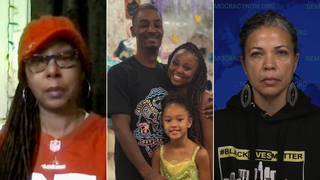
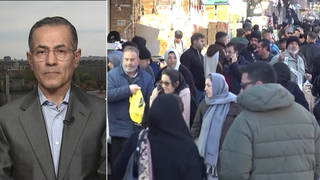
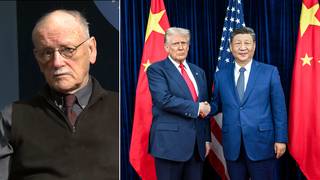
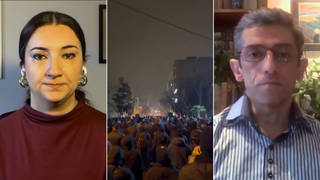
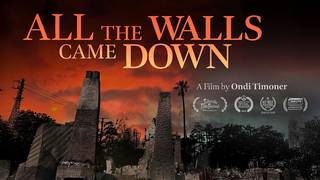
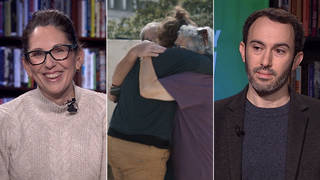
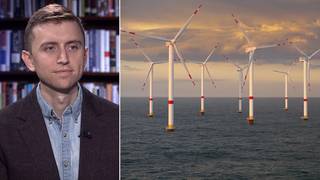
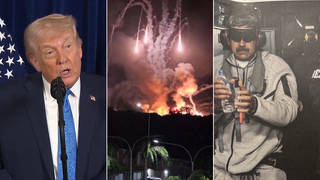


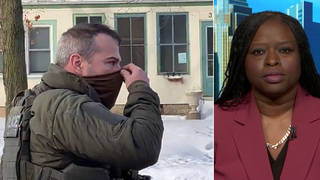
Media Options